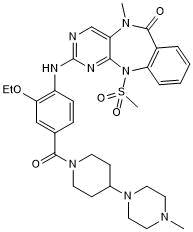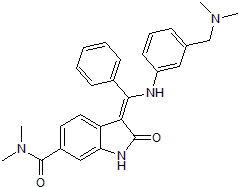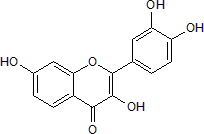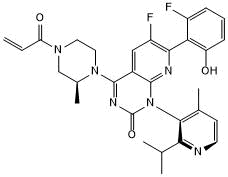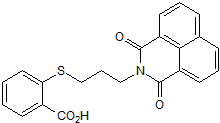ERK Inhibitors: Small Molecules and Peptides
ERK1 and ERK2 (also known as MAPK3 and MAPK1) are 44 and 42 kDa Ser/Thr kinases, respectively. They are part of the Ras-Raf-ERK signal transduction cascade often found downstream of growth factor receptor activation. ERK1 and ERK2 were initially isolated and cloned as kinases activated in response to insulin and NGF. They are expressed in most, if not all, mammalian tissues. Dual threonine and tyrosine phosphorylation activate both ERKs, at Thr202/Tyr204 for human ERK1 and Thr185/Tyr187 for human ERK2.
ERK5, also known as Big Mitogen-activated Protein Kinase 1 (BMK1) and MAPK7, is activated by several mechanisms, including receptor tyrosine kinases, G protein-coupled receptors, and osmotic stress. Like ERK1 and ERK2, ERK5 contains the conserved Thr-Glu-Tyr activation motif in its activation loop. Unlike these ERKs, however, ERK5 contains a unique C-terminal domain that regulates its activation and nuclear translocation.
9 results for "ERK Inhibitors Small Molecules and Peptides" in Products
9 results for "ERK Inhibitors Small Molecules and Peptides" in Products
ERK Inhibitors: Small Molecules and Peptides
ERK1 and ERK2 (also known as MAPK3 and MAPK1) are 44 and 42 kDa Ser/Thr kinases, respectively. They are part of the Ras-Raf-ERK signal transduction cascade often found downstream of growth factor receptor activation. ERK1 and ERK2 were initially isolated and cloned as kinases activated in response to insulin and NGF. They are expressed in most, if not all, mammalian tissues. Dual threonine and tyrosine phosphorylation activate both ERKs, at Thr202/Tyr204 for human ERK1 and Thr185/Tyr187 for human ERK2.
ERK5, also known as Big Mitogen-activated Protein Kinase 1 (BMK1) and MAPK7, is activated by several mechanisms, including receptor tyrosine kinases, G protein-coupled receptors, and osmotic stress. Like ERK1 and ERK2, ERK5 contains the conserved Thr-Glu-Tyr activation motif in its activation loop. Unlike these ERKs, however, ERK5 contains a unique C-terminal domain that regulates its activation and nuclear translocation.
Potent and selective ERK2 inhibitor
| Alternate Names: | VX 11e |
| Chemical Name: | 4-[2-[(2-Chloro-4-fluorophenyl)amino]-5-methyl-4-pyrimidinyl]-N-[(1S)-1-(3-chlorophenyl)-2-hydroxyethyl]-1H-pyrrole-2-carboxamide |
| Purity: | ≥98% (HPLC) |
Selective ERK inhibitor
| Chemical Name: | 5-(2-Phenyl-pyrazolo[1,5-a]pyridin-3-yl)-1H-pyrazolo[3,4-c]pyridazin-3-ylamine |
| Purity: | ≥98% (HPLC) |
ERK5/BMK1 inhibitor; also BRD4 inhibitor
| Chemical Name: | 2-[[2-Ethoxy-4-(4-hydroxy-1-piperidinyl)phenyl]amino]-5,11-dihydro-5,11-dimethyl-6H-pyrimido[4,5-b][1,4]benzodiazepin-6-one |
| Purity: | ≥98% (HPLC) |
Potent and selective ERK5 inhibitor
| Chemical Name: | 5,11-Dihydro-2-[[2-ethoxy-4-[[4-(4-methyl-1-piperazinyl)-1-piperidinyl]carbonyl]phenyl]amino]-5-methyl,11-(methylsulfonyl)-6H-pyrimido[4,5-b][1,4]benzodiazepin-6-one |
| Purity: | ≥98% (HPLC) |
Selective MEK5 and ERK5 inhibitor
| Chemical Name: | (3Z)-3-[[[3-[(Dimethylamino)methyl]phenyl]amino]phenylmethylene]-2,3-dihydro-N,N-dimethyl-2-oxo-1H-indole-6-carboxamide |
| Purity: | ≥98% (HPLC) |
Naturally occuring flavonoid and antioxidant; neuroprotective
| Chemical Name: | 2-(3,4-Dihydroxyphenyl)-3,7-dihydroxy-4H-1-benzopyran-4-one |
| Purity: | ≥97% (HPLC) |
Potent and selective KRASG12C inhibitor
| Alternate Names: | Sotorasib |
| Chemical Name: | (1R)-6-Fluoro-7-(2-fluoro-6-hydroxyphenyl)-1-[4-methyl-2-(1-methylethyl)-3-pyridinyl]-4-[(2S)-2-methyl-4-(1-oxo-2-propen-1-yl)-1-piperazinyl]pyrido[2,3-d]pyrimidin-2(1H)-one |
| Purity: | ≥98% (HPLC) |
Potent and selective PERK inhibitor; orally bioavailable
| Chemical Name: | 4-[2-Amino-4-methyl-3-(2-methyl-6-quinolinyl)benzoyl]-1,2-dihydro-1-methyl-2,5-diphenyl-3H-pyrazol-3-one hydrochloride |
| Purity: | ≥98% (HPLC) |
Selective LPA2 receptor non-lipid agonist
| Chemical Name: | 2-[[3-(1,3-dioxo-1H-benz[de]isoquinolin-2(3H)-yl)propyl]thio]benzoic acid |
| Purity: | ≥98% (HPLC) |




